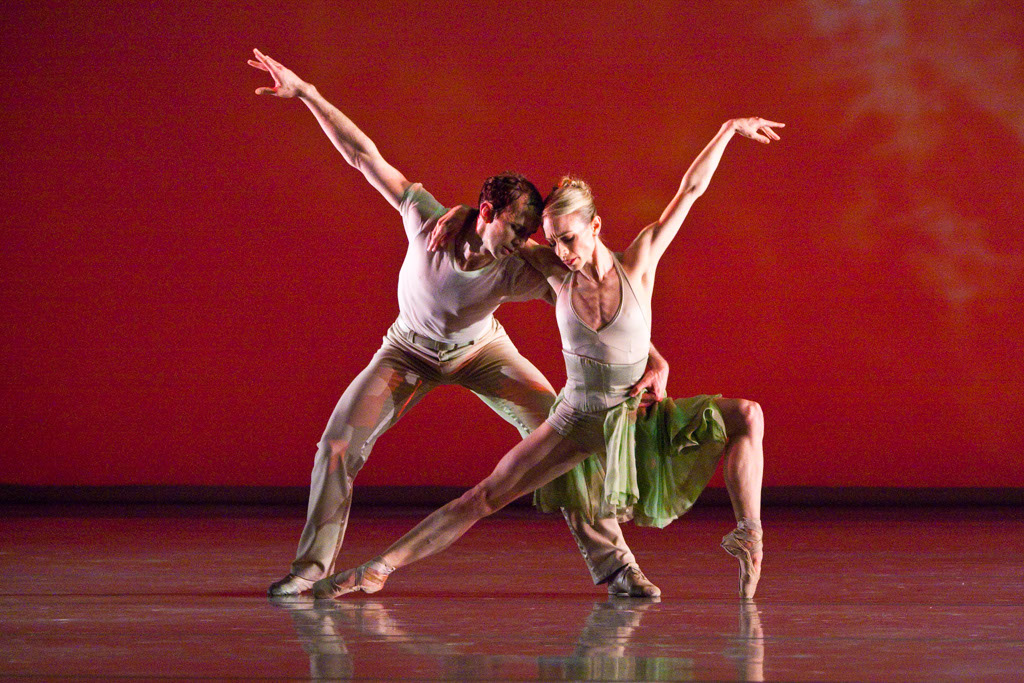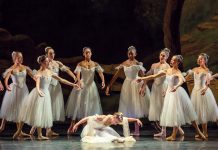
Photo by Kim Kenney. Courtesy of the Atlanta Ballet.
After two decades with the Atlanta Ballet—where he danced iconic parts in ballets like Romeo and Juliet, Swan Lake, and Giselle, and founded the successful Wabi Sabi troupe—principal dancer John Welker is pivoting to a new role. When the December run of Atlanta Ballet’s Nutcracker ends, Welker will take his final bow. We recently chatted with the 42-year-old about working under legendary artistic director John McFall, the inspiration for Wabi Sabi, and his favorite on-stage memory.
You were hired by John McFall not long after he began his 21-year tenure at the Atlanta Ballet. Did his decision to retire last year prompt you to start thinking about retiring yourself?
That process had already begun before John retired, but yeah, it pushed me. I’ve been going to school at Kennesaw State since 2009, chipping away at this bachelor’s degree in dance. It lends a different perspective to what I do, from an academic point-of-view. And every dancer knows in the back of their head that you’re working on borrowed time once you get to a certain age. The body has a limited ability to keep up with the physical demands of what you do. I thought, “I’m 40. John’s retiring. I have two more classes before I finish my degree.” I just said, “This is the time. This is it.” And I have a 3 ½ year old son, Lucas, and I’m really looking forward to spending more time with him.

Photo by Charlie McCullers. Courtesy of the Atlanta Ballet.
Your wife, Christine, retired from the Atlanta Ballet a couple of years ago after the birth of your son. Has she given you any advice?
It’s funny; we’ve known each other so long, I think people would be rather shocked about how little we talk about that sort of thing. We’re more interested in what’s for dinner. (Laughs.) That said, she’s been so supportive, and she understands the transition and what it takes to move in a new direction. As a dancer, your body is the instrument that you identify yourself with, so when you [quit dancing] it’s like you strip away your sense of self. And I witnessed her struggles, so I knew what was coming down the pike—but unfortunately it didn’t make it any easier.
In 2011, you founded Wabi Sabi, the Atlanta Ballet’s off-season outdoor troupe. How did the idea for Wabi Sabi come about?
It happened at the same time I started taking classes at Kennesaw. Before then, in the off-season, Christine and I would travel to other [dance] companies all around the country and around the world to work. And it was so tiring. We really wanted to be in Atlanta, but there were no companies that operated here during the summer. I just felt like, Atlanta’s a big city, there’s room for that. And I also wanted to create a company that would offer Atlanta Ballet dancers summer employment and give emerging choreographers an opportunity to show new work. I saw a lot of potential.
Will you continue to be involved in Wabi Sabi after you retire?
Our last Wabi Sabi show of the year was in November at the High Museum, so I used that as an opportunity to transition [the troupe] to another dancer, Alessa Rogers. Once I retire, I’ll also retire from Wabi. I want to fully commit to a transition.
You’ve danced a number of high-profile roles. Is there a performance that stands out as a career highlight?
I’ve been lucky to have had so many amazing experiences on stage, but there is one that kind of sums up my career and my place within Atlanta Ballet history. In 2011 we performed James Kudelka’s The Four Seasons, danced to Vivaldi’s music, and I got to share the stage with John McFall and [former Atlanta Ballet artistic director] Bobby Barnett and Anne Burton Avery, who was Atlanta Ballet’s very first Sugarplum Fairy. It connected me to Atlanta Ballet’s past and legacy in a very real way. Sharing the stage with them was a moment that I’ll never forget.
What’s next for you?
I’ll finish my degree in May, and I’ve got a lot of ideas floating around. One is pursuing a master’s degree in business. I definitely want to continue with school in some way. To go back for a degree after having a 20-plus year career is pretty unorthodox, but I think it gives me a unique vantage point. And I see a need for that in dance. [Dance institutions] need solid leaders who understand a wide range of dance styles and their places in culture. It’s one way of answering the question that I keep asking myself: How do you continue to pursue the thing you love, just in a new way?










![The North Carolina Museum of Natural Sciences’ newest exhibit is a [pre]historic first](https://cdn2.atlantamagazine.com/wp-content/uploads/sites/4/2024/04/DD-3-100x70.jpg)


